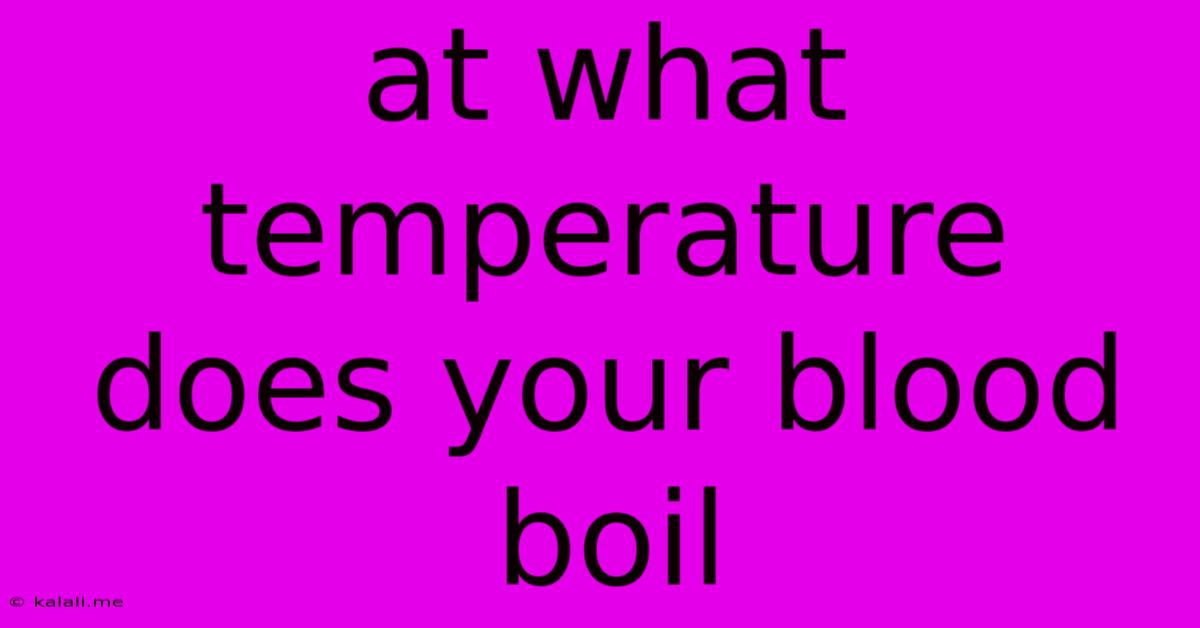At What Temperature Does Your Blood Boil
Kalali
May 09, 2025 · 2 min read

Table of Contents
At What Temperature Does Your Blood Boil? Understanding Body Temperature and Boiling Points
Ever wondered what would happen if your blood actually boiled? It's a dramatic image, often used in science fiction, but the reality is far more nuanced than a simple boiling point. This article explores the science behind blood temperature, boiling points, and why your blood won't spontaneously boil under normal circumstances.
Understanding Normal Body Temperature
First, let's establish a baseline. A healthy human's internal body temperature typically hovers around 98.6°F (37°C). This carefully regulated temperature is crucial for optimal enzyme function and overall physiological processes. Even slight deviations from this range can signal illness. Factors like time of day, activity level, and even menstrual cycles can influence minor fluctuations in body temperature.
The Boiling Point of Water and Blood
Water, the primary component of blood, boils at 212°F (100°C) at standard atmospheric pressure. However, blood isn't just water; it's a complex mixture containing various dissolved substances like proteins, salts, and cells. These components subtly affect its boiling point, but not significantly enough to change the fundamental principle.
Why Your Blood Won't Boil (At Least, Not Easily)
The key to understanding why your blood doesn't boil lies in the concept of atmospheric pressure. The boiling point of a liquid is the temperature at which its vapor pressure equals the surrounding atmospheric pressure. At sea level, atmospheric pressure is relatively high, making it difficult for water (and blood) to boil at lower temperatures.
To boil your blood, you would need to significantly reduce the atmospheric pressure surrounding your body. This could theoretically occur at extremely high altitudes, in a vacuum chamber, or under other extreme conditions. Even then, the boiling point is still determined by the surrounding pressure, making spontaneous boiling unlikely. Your body’s sophisticated mechanisms for maintaining internal temperature would also play a key role in preventing such an extreme event.
Considering Altitude and Other Factors
At significantly high altitudes, like those encountered by mountain climbers at extremely high elevations, the atmospheric pressure decreases. This means the boiling point of water drops; therefore, water boils at a lower temperature. However, even at the highest altitudes, the conditions required for blood to boil are not readily achieved.
Other factors such as the presence of dissolved solids in the blood would increase the boiling point slightly, but this effect is comparatively small. The human body’s homeostasis mechanisms also work to regulate internal temperature effectively, preventing catastrophic shifts in blood temperature.
In Conclusion: A Hypothetical Scenario
While theoretically, under extremely low-pressure conditions, your blood could boil, it's highly improbable under everyday circumstances. Your body's intricate systems, coupled with the complexities of blood composition and the effects of atmospheric pressure, make spontaneous blood boiling a highly unlikely, if not impossible, event for a living human. The dramatic imagery associated with boiling blood remains firmly within the realm of science fiction.
Latest Posts
Latest Posts
-
Are Mitochondria Found In Animal Cells
May 09, 2025
-
Cuanto Es 1 3 De Taza En Onzas
May 09, 2025
-
6 Pies A Metros Cuanto Es
May 09, 2025
-
What Happens When Oceanic Plates Collide
May 09, 2025
-
Renal Artery To Aorta Ratio Calculation
May 09, 2025
Related Post
Thank you for visiting our website which covers about At What Temperature Does Your Blood Boil . We hope the information provided has been useful to you. Feel free to contact us if you have any questions or need further assistance. See you next time and don't miss to bookmark.